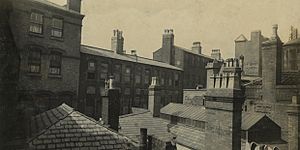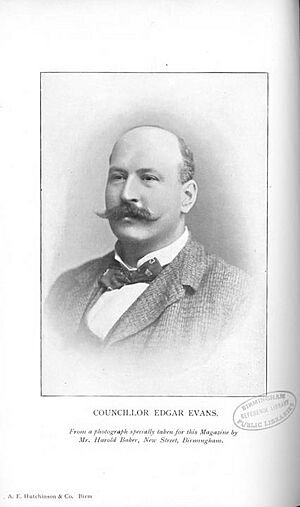Harold Baker (photographer) facts for kids
Harold Baker (1860–1942) was a British photographer. He lived and worked in Birmingham, England. He was known for his amazing pictures of buildings and important events.
Contents
Who Was Harold Baker?
Harold Baker was born in Birmingham in 1860. His father, Samuel Henry Baker, was a talented artist. Samuel was also a member of the Royal Birmingham Society of Artists. Harold's brother, Oliver Baker, was also an artist and a designer.
Harold went to King Edward's School, Birmingham in New Street, Birmingham. After school, he trained to be a wood-carver. He learned to carve church furniture. He also learned to design stained glass windows.
Starting His Photography Career
Harold Baker loved photography as a hobby. In 1886, he opened his first photo studio. It was located at 17 Cannon Street in Birmingham. The next year, he moved his studio to New Street.
He became the official photographer for the Birmingham Archaeological Society. This group studied old buildings and history. Harold took over this role from Robert W. Thrupp.
Around 1897, Harold worked closely with the Birmingham Magazine of Arts and Industries. He became the magazine's official photographer. He also often shared his photos and articles with other photography magazines. One of these was Practical Photographer.
Photographing a Royal Event
In 1902, Harold Baker got a very special invitation. He was asked to help John Benjamin Stone. Stone was the official photographer for the coronation of King Edward VII.
Harold Baker is famous for one particular photo. He took the only known picture of the King's proclamation. This important announcement happened at St James's Palace.
Later Years and Legacy
In 1921, Harold Baker helped judge a photo exhibition. It was the first annual show for the Soho Hill Men's Movement Camera Club.
Today, many of his works are kept safe. The Library of Birmingham has a large collection. It includes over 200 old prints. These are mostly photos of buildings and historical sites. They show places in and around Birmingham from the 1870s and 1880s. The library also has 500 glass negatives. These are like the original film for his photos.



